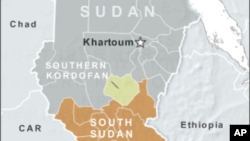AWEIL, SOUTH SUDAN —
More than 50 South Sudanese have been forced to flee their homes in Southern Kordofan state in Sudan after a raid they say was carried out by Misseriya Arab Nomads and claimed scores of lives.
The 53 displaced South Sudanese say a group of armed men attacked their village on the night of February 9, burnt down houses and killed at least 50 villagers. It has not been possible to independently verify casualty figures or other details of the attack.
For nearly 10 days, the displaced villagers walked through the bush and forest before reaching Ariath, a town just inside South Sudan in Northern Bahr al Ghazal, survivors said.
One of the survivors of the alleged attack, Abuk Deng, said she was separated from her husband during the raid and doesn't know if he is alive or dead.
Another, Fardos Dut Kuan, said the South Sudanese villagers ate wild berries to stay alive as they fled through the forest.
Both said the attack took the villagers by surprise.
“A group of men came to our village and after an hour, they started raising complaints against us, that we are not supposed to stay with them, and they set fire to our village at Kokab. Now some of my brothers have fled , to where I don’t know, ” Kuan said.
The attack could have been carried out in revenge for the slaying of a Messiriya cattle keeper a day before the attack, she said, adding that the villagers were not involved in that killing.
Deng said the attack was carried out by "men who water their cattle in the village."
“They started burning our houses in the night," she said.
"They burnt only our village, Kokab, where the South Sudanese live."
A team from South Sudan’s Relief and Rehabilitation Commission (SSRRC) was in Ariath Wednesday to assess the needs of the displaced South Sudanese.
SSRRC Director for Northern Bahr al Ghazal state, Deng Kuel Kuel, said his agency will work with the national Ministry of Humanitarian Affairs and international NGOs to meet the needs of the displaced South Sudanese.
Nearly two years after South Sudan broke away from its northern neighbor, hundreds, and possibly thousands of South Sudanese still live in South Kordofan state.
Kuel said the SSRRC has been working with South Sudanese living in different parts of Sudan to try to get them to return home.
The 53 displaced South Sudanese say a group of armed men attacked their village on the night of February 9, burnt down houses and killed at least 50 villagers. It has not been possible to independently verify casualty figures or other details of the attack.
For nearly 10 days, the displaced villagers walked through the bush and forest before reaching Ariath, a town just inside South Sudan in Northern Bahr al Ghazal, survivors said.
One of the survivors of the alleged attack, Abuk Deng, said she was separated from her husband during the raid and doesn't know if he is alive or dead.
Another, Fardos Dut Kuan, said the South Sudanese villagers ate wild berries to stay alive as they fled through the forest.
Both said the attack took the villagers by surprise.
“A group of men came to our village and after an hour, they started raising complaints against us, that we are not supposed to stay with them, and they set fire to our village at Kokab. Now some of my brothers have fled , to where I don’t know, ” Kuan said.
The attack could have been carried out in revenge for the slaying of a Messiriya cattle keeper a day before the attack, she said, adding that the villagers were not involved in that killing.
Deng said the attack was carried out by "men who water their cattle in the village."
“They started burning our houses in the night," she said.
"They burnt only our village, Kokab, where the South Sudanese live."
A team from South Sudan’s Relief and Rehabilitation Commission (SSRRC) was in Ariath Wednesday to assess the needs of the displaced South Sudanese.
SSRRC Director for Northern Bahr al Ghazal state, Deng Kuel Kuel, said his agency will work with the national Ministry of Humanitarian Affairs and international NGOs to meet the needs of the displaced South Sudanese.
Nearly two years after South Sudan broke away from its northern neighbor, hundreds, and possibly thousands of South Sudanese still live in South Kordofan state.
Kuel said the SSRRC has been working with South Sudanese living in different parts of Sudan to try to get them to return home.





